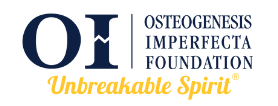SHARE
Planning a Family
Yes. Many men and women who have OI are parents. All young people who have OI need to receive information about reproductive health, sexuality and the genetics of OI. There is some research that indicates that couples with any genetic disorder may have a lower success rate for becoming pregnant, but OI does not prevent having children. Many people with OI conceive children naturally. Sometimes their children have OI.
Can women who have OI use birth control pills?
In most cases, the answer is yes. Women of short stature should consult with their doctor about whether a low-dose pill would be more appropriate for them and whether the birth control pill they wish to use is associated with bone density loss.
Should adults considering parenthood seek genetic counseling?
Many couples seek genetic counseling before they become pregnant. This can be a good way to get answers to personal questions about OI and genetics.
Knowing the parent’s OI mutation is helpful in planning for delivery and for determining if the child has OI. Certain methods of prenatal diagnosis of OI are only possible if the affected parent’s mutation is known.
What are the odds of passing OI on to your children?
When one parent has OI there is a 50% chance with each pregnancy that the child will have OI. If both parents have OI there is a 75% chance that the child will have OI. Usually, the child will have the same OI-causing mutation as the parent, although the child’s symptoms can be similar, milder or more severe than the parent’s symptoms. No one knows for sure how or why this happens.
When a parent has a moderate or severe form of OI and no collagen mutation can be identified, then a test for one of the recessive forms of OI is needed. If a person with OI has a recessive form of OI, then his or her siblings have a 50% chance of being carriers of the recessive gene. When both parents are carriers of a recessive OI mutation, there is a 25% chance that their child will have OI.
Excluding OI, the risk of other congenital disorders in pregnancies in which one parent has OI is the same as that of the general population.
Is it possible to change the odds?
At this time, there are no treatments or dietary supplements that can prevent the fetus from having OI or that will make the type of OI milder. There are several biotechnology options available, including using a sperm or egg donor or pre-implantation genetic diagnosis (PGD). Detailed information about each option can be obtained from your primary care doctor, your gynecologist, a genetic counselor or from fertility clinic staff.
Are there special concerns if the mother is the person with OI?
All women with OI need expert medical care during pregnancy. Women who are considering a pregnancy should work with their doctor to ensure that they go into pregnancy in good health and that any OI-related health issues are addressed. Short stature, a history of pelvic or spine fracture, back pain and a history of respiratory problems are important areas for discussion. It takes women with OI longer to recover from the bone loss associated with any pregnancy. The obstetrician can also provide information about prenatal testing, such as ultrasound, and may order additional testing to help plan for delivery.
What are the special considerations when the father has OI?
When the father has OI, the obstetrician may suggest additional ultrasounds to see if the fetus shows any signs of having OI.
Do people who have OI qualify to be adoptive or foster parents?
Yes. Many resources are available to help adults learn about adoption or becoming a foster parent. Information about foster parenting is available by contacting your local government’s Department of Social Services or organizations such as The National Foster Parent Association (www.nfpainc.org ). The National Adoption Center (www.adopt.org ) offers background information on the adoption process. The organization, Through the Looking Glass (www.lookingglass.org ) offers support to people with disabilities who wish to adopt.
